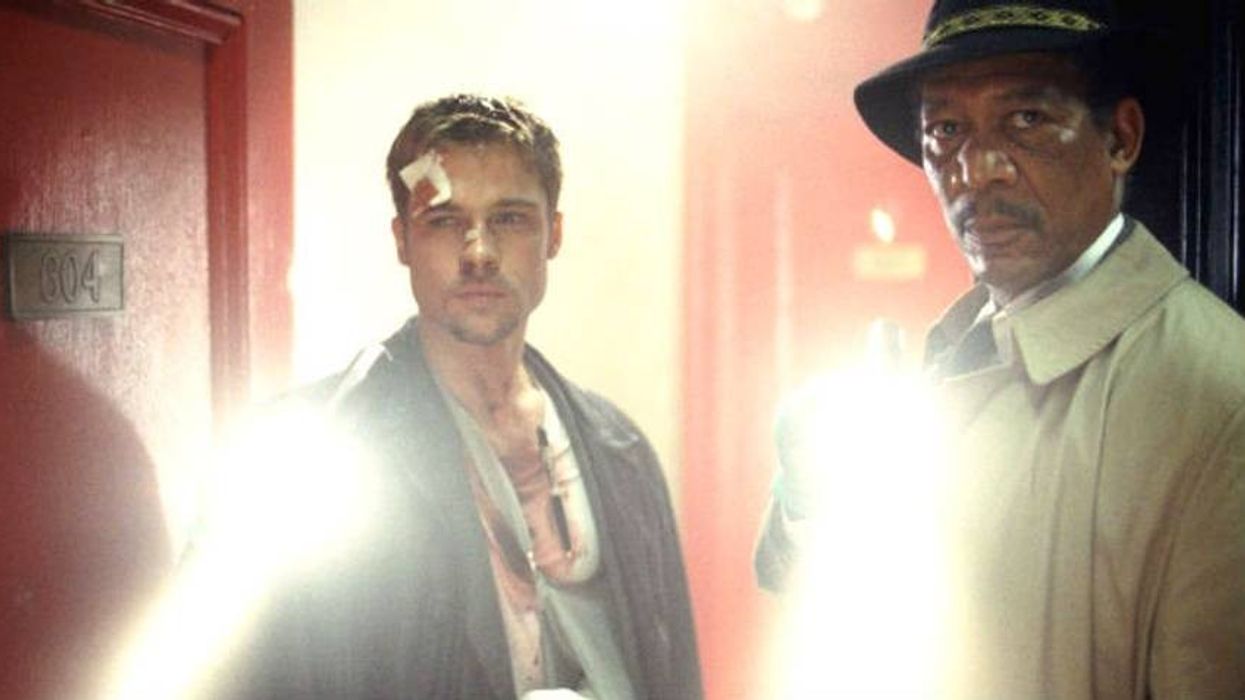5 Screenwriting Lessons from the 'Se7en' Script PDF
Se7en turned 25 this week, and it still holds up as one of the best crime thrillers ever made.

The older I get the more I understand Somerset, and the worse I feel for Mills. Se7en is one of those movies that sticks with your forever. It is the ultimate twist on the buddy cop movie. Instead of falling into the humor tropes, these guys are served with a case that will haunt them forever: a serial killer whose targets all follow the 7 deadly sins.
Written by Andrew Kevin Walker and directed by David Fincher, Se7en left us with one of the greatest movie lines of all time...
"What's in the box?"
That line, unlike some characters, will live forever and was recently given a retrospective from The Ringer.
Today, I wanted to go through the story of Se7en and pull out the 5 lessons I think would be most valuable to our readers.
Read and download the Se7en script PDF here!
5 Lessons from the Se7en script...
1. Introduce a new world
I don't mean something in fantasy. I mean introduce your characters to a new world. That way you can get your exposition across without it feeling laborious. Mills is new to New York, so Somerset can introduce him to that world. Somerset is new to having a partner...and his last one didn't work out, so Mills can pull details out of him on that as well.
This kind of worldbuilding is important in your earlier acts because it also allows the audience to connect to the world and understand where this story is going.
We know very quickly the stakes and world here. Somerset is retiring and Mills is looking for a new beginning. That juxtaposition gives us all we need.
2. Ground every emotion
Here's how Se7en went from good to great—it hit every emotion on the head. Mills desperately wants to make more money to provide for his family and make something of himself. Somerset is a guy who lost the family he never knew he wanted.
We feel this stuff so much—why? Well, we have seen them show it!
First is the dinner with Somerset and Mills. In this scene, we see how Mills and his wife interact. How they love each other even if they're not sure about this new situation.
But then we get a followup later in the diner with Somerset and Mills' wife. That's where we get the reveals of the emotions and the ramifications of the decisions in front of them. While these scenes seemingly have nothing to do with the case, the character that comes forward matters later on, namely how they handle the suspects and investigation.
And why they care about the box.
3. Bad guys in control
I love Se7en because we actually don't even meet the bad guy until very late in the film. Sure we see his work and see him posing as a reporter, and there's even a chase! But we don't get him until he turns himself in. That's a choice in the writing.
John Doe is a bad guy in control, pulling the strings, making his presence known the whole time. We see his work, therefore he exists. Not showing him adds to his mystery, and again, against tropes, when he shows up, he looks nothing like what many might have expected.
Having a bad guy in control is very fun and a new twist on the genre. Having him win at the end was even noisier and made this script incredibly popular in Hollywood.
4. Time locks
Somerset is going to retire in a week. John Doe has plans to kill 7 people and we have to catch him before it happens. Time locks give urgency to your character's cause. It allows there to be tension in every scene. Things need to be finished by a certain time.
They can be things you drop in like an actual ticking clock...or they can be certain periods of time in which things will happen.
Either way, Se7en uses them to keep the story coming with intensity.
5. "What's in the box?"
Maybe one of, if not the, most tense scenes in film history has to be when Somerset and Mills take John Doe out to the middle of nowhere...and receive a package. This is a standoff between the bad guy and our heroes. The line, "What's in the box?" is one of the greatest of all time. It sums up the entire movie. Our characters succumbing to the realization that they have lost. That "what's in the box" makes John Doe the winner. It's also a test. Mills needs to know. He needs the only person he trusts to tell him the truth. Somerset knows the truth will only make things worse.
That's the theme of this movie. Is the world a good place or a bad place? Are we all good or do we all have evil inside of us?
This ending has been famously toyed with, Fincher played with different versions and so did Andrew Kevin Walker.
Kudos to them, because the ones we got were perfect.
I think this story and script are some of the best to learn from. It's one of my favorite movies of all time and a modern classic that should be appreciated much more.
Anyway, at least we're not in the box.
Love Se7en? Sound off in the comments.
What's next? Get our free screenwriting eBook!
So much of what we're talking about on No Film School when it comes to screenwriting is summarized in our new eBook. It also helps guide you through a 10-week writing plan that will get your script actually finished.











